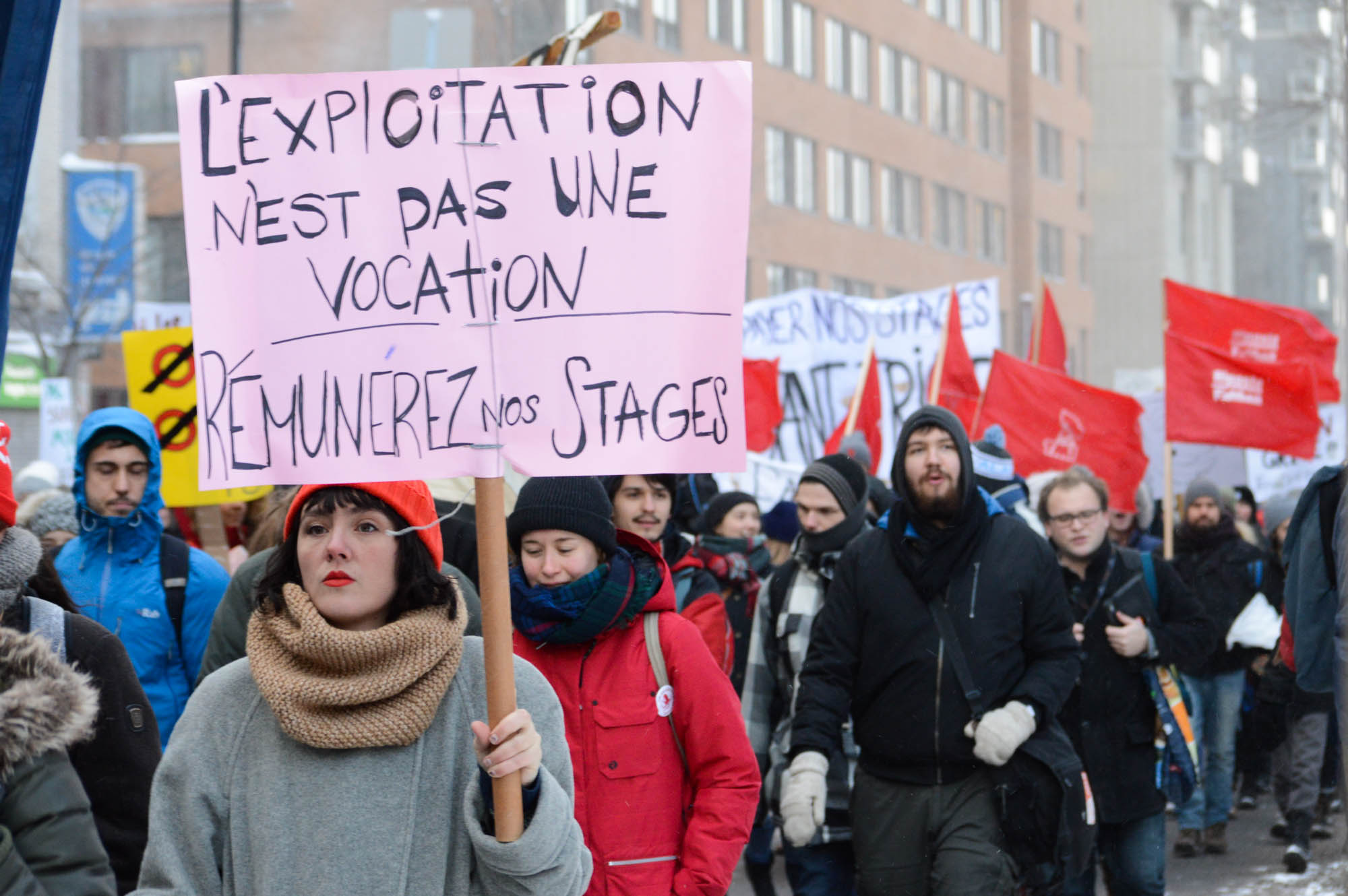Tens of thousands of university and CEGEP students march for remuneration
Tens of thousands of university and CEGEP students braved the cold on Nov. 21 to protest against unpaid internships.
Coinciding with International Interns Day on Nov. 10, about 20,000 students from associations from Université du Québec à Montréal (UQAM), Université de Montréal and McGill University took part in the demonstration as part of their week-long strike against unpaid internships from Nov. 19 to 23.
Jessica Mitchell, a worker at Campagne unitaire sur le travail étudiant (CUTE), said that multiple student associations announced the strike by voting in October during their general assemblies.
The purpose of the strike was to demand that students’ work be recognized and remunerated. Many students from Cégep du Vieux Montréal, Collège Montmorency and Cégep de Saint-Laurent were also present at the demonstration. The event began at 3 p.m. at Place Émilie-Gamelin, next to the Berri-UQAM metro.
Throughout the march, students chanted in French, “Let’s scream louder so no one can ignore us” and “Remuneration for internships.”
“The message I would give to the government is to stop exploiting interns because they need us,” said Maryse Forget, an education student at UQAM. “All internships must be paid in all fields.”
According to Forget, the biggest challenge many education students face is that they often aren’t allowed to work part-time jobs in addition to their internship because of concerns that the students won’t be able to fully commit themselves to the internship.
“We want internships to be paid so that we do not have to deal with this financial stress,” Forget said. “Being an intern is already emotionally stressful. On top of that, having financial stress can result in a burnout.”
According to a survey conducted in 2017 by the committee for the remuneration of internships at the l’Université du Québec en Outaouais, heavy workloads that students often carry during internships can have unhealthy impacts. Twenty per cent of survey respondents said they felt overworked, were sleep deprived and experienced a difficulty in balancing work, internship, studies and personal life. In addition, 42 per cent of respondents reported experiencing anxiety, isolation and psychological distress during their internship.
According to UQAM’s education department’s student association, about 84 per cent of interns in the education field are women. Forget added that many unpaid internships are in female-dominated fields, such as teaching, social work and nursing. “It’s a feminist strike because we see that fields for women are being exploited,” she said.
Jacqueline Ohayon, a McGill student and social work intern at Just Solutions legal clinic, said that there is an issue of trust between employers and interns. “We are trusted to provide the services but not trusted with the wages,” Ohayon said. “We want that labor to be recognized.”
Mitchell said that this is an issue of sexism because internships in predominantly male fields, such as engineering and computer science, are often paid whereas those often geared toward women are not.
“People will often say that interns are supposed to be learning and you should not be paid to learn,” Mitchell said.
Mitchell added that unpaid internships are becoming more common in Quebec due to the competitive nature of many fields. “Some students are expected to boost up their resumes through unpaid internships,” Mitchell said.
Although many students have called for an unlimited general strike in January 2019 if the government does not implement changes, Mitchell said that this is not necessarily set in stone. “We will hold general assemblies among student associations and vote to decide whether or not we will go on strike or not,” she said.
John Hutton, the finance coordinator for the Concordia Student Union (CSU), also participated in the march, and said that the CSU is in favour of the strike. “There are a number of students at Concordia who have to deal with this as well, and we are here to support them and say that all work should be paid,”he said.
According to Hutton, this problem isn’t specific to Montreal. “There are many students across Canada who are forced to work unpaid internships in order to complete their degrees,” he said. “That’s not fair, and it’s a question of justice. All work should be paid.”
“Pay people for their work,” Hutton said. “It can’t be said enough. It is as simple as that. You work, you get paid. Doesn’t matter if you’re young or a student. If you work, you deserve to be paid.”
Photos by Mackenzie Lad.





